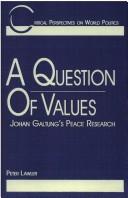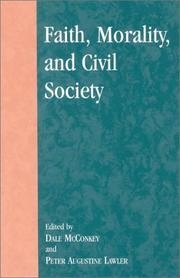| Listing 1 - 5 of 5 |
Sort by
|

ISBN: 0585127778 9780585127774 1555875076 Year: 2022 Publisher: Boulder
Abstract | Keywords | Export | Availability | Bookmark
 Loading...
Loading...Choose an application
- Reference Manager
- EndNote
- RefWorks (Direct export to RefWorks)
The first comprehensive, critical account of the development of Johan Galtung's thought.
Peace --- Peace science --- Research. --- Galtung, Johan. --- Galtung, J. --- Galtung, Johan, --- ガルトゥング·ヨハン

ISBN: 9786613926579 073915494X 128361412X 9780739154946 6613926574 0739104829 9780739104828 0739104837 9780739104835 Year: 2003 Publisher: Lanham, MD Lexington Books
Abstract | Keywords | Export | Availability | Bookmark
 Loading...
Loading...Choose an application
- Reference Manager
- EndNote
- RefWorks (Direct export to RefWorks)
Editors Dale McConkey and Peter Augustine Lawler explore the contributions that religious faith and morality can make to a civil society.
Religion and civil society --- Religious ethics --- United States --- Religion
Book
ISBN: 0739124803 0739139738 9780739139738 9780739124802 9780739124819 0739124811 Year: 2009 Publisher: Lanham, Maryland : Lexington Books,
Abstract | Keywords | Export | Availability | Bookmark
 Loading...
Loading...Choose an application
- Reference Manager
- EndNote
- RefWorks (Direct export to RefWorks)
Democracy Reconsidered provides an enlightening study of democracy in America's post-modern context. Elizabeth Kaufer Busch and Peter Augustine Lawler explore some of the foundational principles of democracy as they have been borne out in American society. The essays included in this volume examine the lessons that novelists, philosophers, and political theorists have for democratic societies as they progress towards postmodern skepticism or even disbelief in the absolute principles that form the foundation of democracies.
Democracy --- United States --- Politics and government. --- Government --- History, Political
Book

ISBN: 1501757911 1609090977 0875804756 9780875804750 9781609090975 9781501757914 Year: 2021 Publisher: Ithaca, NY
Abstract | Keywords | Export | Availability | Bookmark
 Loading...
Loading...Choose an application
- Reference Manager
- EndNote
- RefWorks (Direct export to RefWorks)
The Science of Modern Virtue examines the influence that the philosopher Rene Descartes, the political theorist John Locke, and the biologist Charles Darwin have had on our modern understanding of human beings and human virtue. Written by leading thinkers from a variety of fields, the volume is a study of the complex relation between modern science and modern virtue, between a kind of modern thought and a kind of modern action. Offering more than a series of substantive introductions to Descartes', Locke's, and Darwin's accounts of who we are and the kind of virtue to which we can aspire, the book invites readers to think about the ways in which the writings of these seminal thinkers shaped the democratic and technological world in which modern human beings live.Thirteen scholars in this volume learnedly explore questions drawn from the diverse disciplines of political science, philosophy, theology, biology, and metaphysics. Let the reader be warned: The authors of these essays are anything but consensual in their analysis. Considered together, the chapters in this volume carry on a lively internal debate that mirrors theoretical modernity's ongoing discussion about the true nature of human beings and the science of virtue. Some authors powerfully argue that Locke's and Darwin's thought is amenable to the claims made about human beings and human virtue by classical philosophers such as Aristotle and classical Christian theologians such as Thomas Aquinas. Others make the opposite case, drawing attention to the ways in which Descartes, Locke, and Darwin knowingly and dialectically depart from central teachings of both classical philosophy and classical Christian theology.
Virtue. --- Descartes, René, --- Darwin, Charles, --- Locke, John, --- Influence. --- modern understanding of humans, human virtue.
Book

ISBN: 1501751298 1609091574 9781609091576 9781501751295 9780875804842 0875804845 Year: 2014 Publisher: Ithaca, NY
Abstract | Keywords | Export | Availability | Bookmark
 Loading...
Loading...Choose an application
- Reference Manager
- EndNote
- RefWorks (Direct export to RefWorks)
While the dominant approaches to the current study of political philosophy are various, with some friendlier to religious belief than others, almost all place constraints on the philosophic and political role of revelation. Mainstream secular political theorists do not entirely disregard religion. But to the extent that they pay attention, their treatment of religious belief is seen more as a political or philosophic problem to be addressed rather than as a positive body of thought from which we might derive important insights about the nature of politics and the truth of the human condition.In a one-of-a-kind collection, DeHart and Holloway bring together leading scholars from various fields, including political science, philosophy, and theology, to challenge the prevailing orthodoxy and to demonstrate the role that religion can and does play in political life. Contributing authors include such important thinkers as Peter Augustine Lawler, Robert C. Koons, J. Budziszewski, Francis J. Beckwith, and James Stoner.
| Listing 1 - 5 of 5 |
Sort by
|

 Search
Search Feedback
Feedback About UniCat
About UniCat  Help
Help News
News